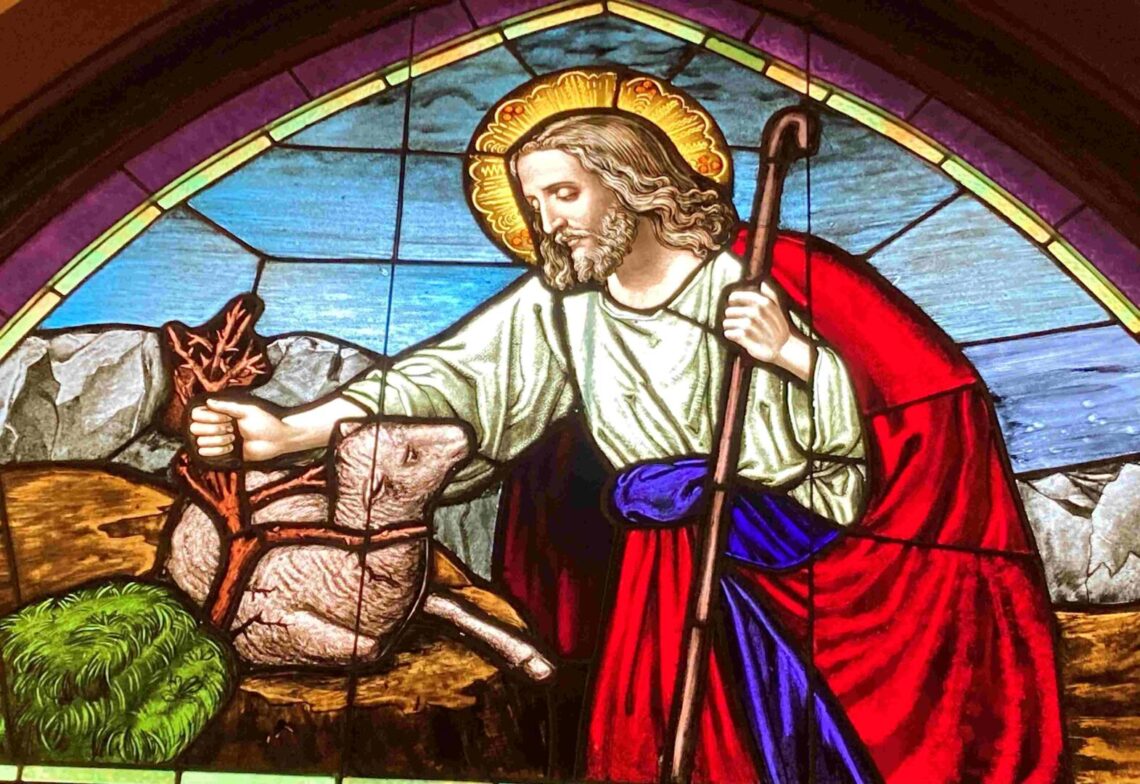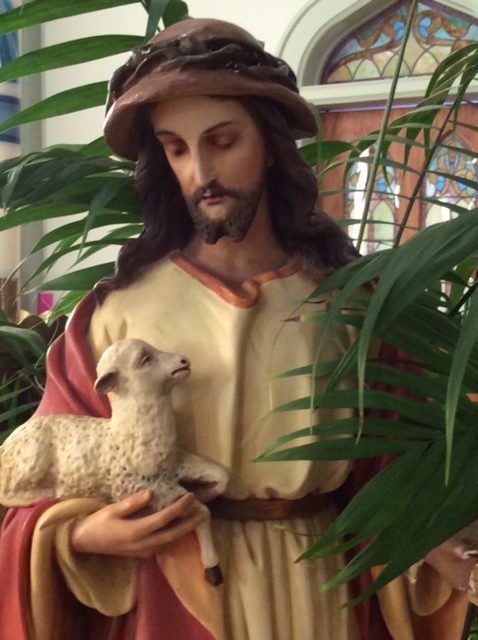Franciscan Friar Fr. Paul Gallagher reflects on the Gospel readings for the Fourth Sunday of Easter. Who are the people whose lives have expressed true concern for you?
The content is edited by Franciscan Sister of Christian Charity Sister Anne Marie Lom and Joe Thiel. The excerpts from the Sunday readings are prepared by Joe Thiel. To read or download the complete pdf with excerpts for your prayer, please click here Francisccan Gospel Reflections April 14 2024. Excerpts are from the Lectionary for Mass for Use in the Dioceses of the United States of America, second typical edition © 2001, 1998, 1997, 1986, 1970 Confraternity of Christian Doctrine, Inc., Washington, DC. Used with permission. All rights reserved. No portion of this text may be reproduced by any means without permission in writing from the copyright owner. Photo: We share the Jesus the Good Shepherd window from St. Michael Catholic Church, Whitelaw, Wisconsin. Deacon Randy Jaeckels, pastoral coordinator, gave permission for use of this photo. You are invited to see the beauty of the image in person at a weekend liturgy.
John 10:11-18 (Good Shepherd Sunday)
Jesus said: “I am the good shepherd. A good shepherd lays down his life for the sheep. A hired man, who is not a shepherd and whose sheep are not his own, sees a wolf coming and leaves the sheep and runs away, and the wolf catches and scatters them. This is because he works for pay and has no concern for the sheep.
“I am the good shepherd, and I know mine and mine know me, just as the Father knows me and I know the Father; and I will lay down my life for the sheep. I have other sheep that do not belong to this fold. These also I must lead, and they will hear my voice, and there will be one flock, one shepherd. This is why the Father loves me, because I lay down my life in order to take it up again. No one takes it from me, but I lay it down on my own. I have power to lay it down, and power to take it up again. This command I have received from my Father.”
Background:
On the fourth Sunday of Easter in all three years of the liturgical cycle, the Gospel is taken from the tenth chapter of John’s Gospel, known as the Good Shepherd Discourse. It may be helpful to slowly read through the entire tenth chapter of John’s Gospel as part of your preparation for this Sunday.
Often communities of ancient Israel would have had an enclosure at the perimeter of the village where the community’s sheep were kept and protected. One person would guard this common pen until each shepherd had arrived to gather his flock and take them to pasture.
Because the experience of shepherding was so common in ancient Israel, it became a common image used to reflect on God’s relationship to the people. The good shepherd is like Moses and David, who are described as faithful to their duty of protecting their flock. Israel also had bad leaders and prophets who led the people into false worship or exploited the people–these were described as false shepherds (Ezekiel 34). This familiar image is used by John in the tenth chapter of his Gospel to help describe Jesus’ relationship in contrast to the Scribes and Pharisees.
The Gospel text for today is composed of two paragraphs, each of which begins with the statement: “I am the good shepherd.” In the first, Jesus portrays himself as a shepherd who takes his commitment to care for his sheep so seriously that he is willing to place his own life in jeopardy. Typically, shepherds of the day were viewed as people who lacked moral responsibility, like the shepherd who abandons the sheep at the first sight of danger.
The second paragraph uses the image of the shepherd to describe the relationship of God to the world in and through the second person of the Trinity. Jesus’ crucifixion as the one who is willing to lay down his life is central to his relationship to the Father and through him to others. Therefore, the shepherd is described as having a special and intimate relationship with God, which is extended, through him, to the sheep and beyond. His shepherding reaches beyond his fold to those that belong to other folds. These others also recognize his voice and follow him, becoming part of the “one fold.” He does not do this on his own, but because he is faithful to the will of God.
Reflection Questions:
1. Who are the people whose lives have expressed true concern for you?
2. Are there also people in your life who seem to have little true concern for you personally?
3. Are there also people for whom you have true concern for their well-being?
4. Are there also people in your life for whom you do not have a sense of true concern?
5. Are you aware of what it is in you that has you put some in one group and others in the second group?
6. What life experiences teach you that you are among those for whom God cares a great deal and is concerned about you?
7. Do you also have some life experiences that make you doubt God’s concern for you?
8. Do you also have experiences that suggest to you that God’s concern is broader and more inclusive than some might think? How do you feel about that?
9. Who do you think Jesus was talking about when he said that he has other sheep not of this fold?
10. Can you take time to talk about your reaction to this Gospel and the idea that God can be compared to a Good Shepherd?




